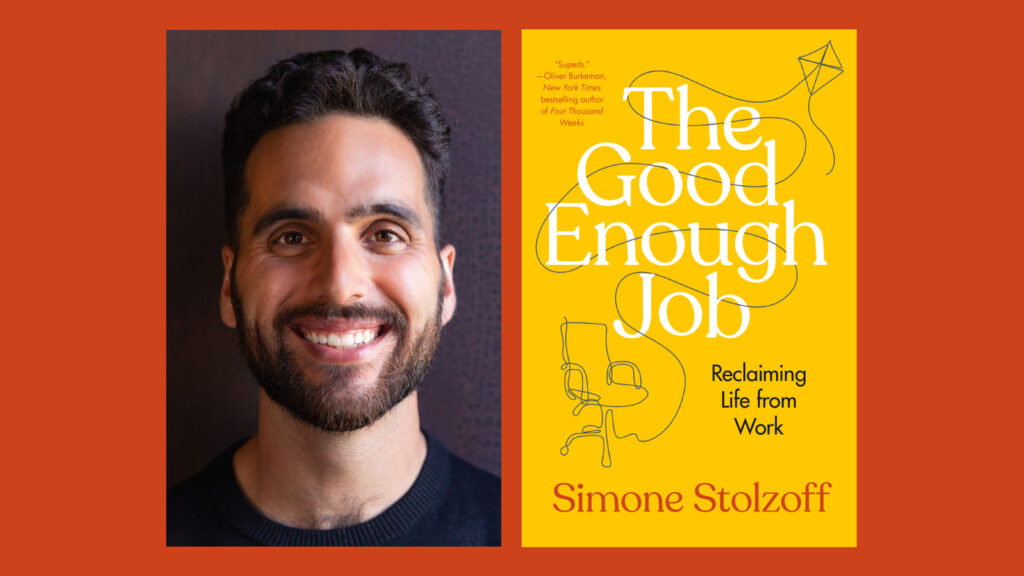However, as graduation approaches, and as we at the Career Development Center see students scattering from their classrooms and marching proudly to the job market, I’ve started reflecting on what it means to have a dream job, specifically about how aspirations are wonderful and motivating but can also be debilitating too.
A few months ago, I picked up an unassuming yellow book called The Good Enough Job. Written by Simone Stolzoff, this book is about the dichotomy between work and life and what happens when the lines between your job and the source(s) of self-fulfillment blur.

For many students at Emerson, electing to go to a liberal arts college was an intentional choice—studying the arts is often a decision made of passion than it is of monetary gain (though for some lucky few, it might be one and the same). However, Stolzoff states that oftentimes “the expectation that work will always be fulfilling can lead to suffering” because “when we expect work to self-actualize—to constantly motivate and fulfill us—settling for anything less can feel like a failure.”
That’s exactly what this article seeks to uncover: the difference between ambition and aspiration, and the unexpected danger of dreaming against the cull of reality.
Much like a genesis, Stolzoff starts his book by exploring the notion of where dream jobs come from in the first place. Stolzoff pins the blame on the US’s capitalist sentimentality, writing, “using productivity to measure worth is a standard we also impose on ourselves. And in the process, many Americans have internalized the values of our dominant economic system…” Many other countries in the world operate on the capitalist system and do so successfully while at the same time keeping their workers content. However, the reason why hustle culture, burnout, and high turnovers are so prevalent in America is because “here, capitalism is not just an economic system.” What Stolzoff means by this is that capitalism not only pervades the way we work, but also the way we view our self-worth. The capitalist system has ingrained itself so deeply in the subconscious of the American spirit to the point that it is no longer just an economic system but also a social philosophy that dictates a person’s value to society and qualifies it on the quality of their output. Stolfzoff says, about this shift, that “productivity is more than a measurement [in our world]; it’s a moral good.”
Emerson students are known to be overachievers, running from one extracurricular to the next, cramming work-study shifts between back-to-back classes, working on student films and manuscripts in the hours that they do have any free time. While this work is fulfilling during one’s college years, transferring the same expectation of “busyness” into one’s work life can be incredibly draining.

For those (including myself) who have, throughout their time at college, accepted the mantra of “Growth is progress” and “Stagnation is death,” it may very well be beneficial to take a step back and reflect on whether those values actually still hold true once you step out of Emerson’s doors for the last time as a student.
To help readers more easily understand this notion, Stolzoff tells the tale of a father who spends his whole life building a time machine, only to run out of time to use it:
“My father built a time machine and then he spent his whole life trying to figure out how to use it to get more time. He spent all the time he had with us thinking about how he wished he had more time, if he could only have more time.”
As young adults, many of us have spent the majority of our lives in school (and if we’re not in school, we’re either sleeping or otherwise working part-time jobs, work-study positions, internships—you get the gist). We are told to work towards our “dream jobs”—and we are promised that if we work hard at our internships, network intensively with our professors, and to make the most of our time at Emerson.
At the same time, however, it is also true that we aren’t told, nearly enough, this one other thing: it’s okay not to have a dream job. It’s okay to have ambitions—to want to do big things—but also not have aspirations—to not know what those big things are. As a matter of fact, it would be beneficial for us to be motivated but also open-minded. Instead of chasing the high of a dream job—only to be sorely disappointed when it turns out to be less-than-perfect, or, worse, a nightmare role—perhaps we should instead settle for “the good enough job.”
But what is the “good enough job,” exactly? Stolzoff describes it as having three integral components:

Stolzoff states, “I can’t tell you what to worship. But I do know that when you don’t take an active role in determining what you value, you inherit the values of the systems around you. And when you invest in multiple sources of meaning—when you hold multiple definitions of what makes life valuable—you invest in yourself in a way no company, boss, or market can control.” When you are able to define, clearly, what is important to you, you are less likely to be susceptible to outside forces (such as your boss) swaying your opinion or attempting to force a line of thinking that is wildly incongruent and incompatible with your value system.

When you are bound to a role which feels overly perfect, almost too good to be true, you are more likely to be taken advantage of. If you feel as though your worth is lesser than that of your position, you are more vulnerable to being exploited. To resolve this, Stolzoff reminds us not to ignore “the tedium that exists in every line of work, [as it binds] blinds us to the flaws a dream job may have, and creates conditions in which workers are willing to accept less than they deserve.” By not wearing rose-tinted glasses and evaluating your role with a critical, objective eye, you will be able to stand on your principles and resist those who try to suppress what you know you deserve.

According to Stolzoff, “Good enough is an invitation to choose what sufficiency means—to define your relationship to your work without letting it define you.” And that, realistically, ties it to the very title of the book that we began with: The Good Enough Job.
“It starts with a simple acknowledgment: you aren’t what you do.” I’d argue it ends with that too.